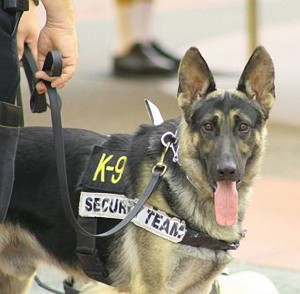Drug Sniffing Dogs Go To The Supreme Court
The old saying is that a dog is a man’s best friend, but this proverb wouldn’t apply if the best friend assisted in getting the man arrested. The use of dogs has continued to climb since the Supreme Court announced in U.S. v. Place (1983) that the use of dogs to find drugs was not a search under the Fourth Amendment’s prohibition against search and seizures without a warrant. However, the latest case before the high Court asks whether the use of dogs triggers the other half of the Fourth Amendment: obtaining a search warrant through probable cause.
In 2006, Florida police received a tip that Joelis Jardines was growing marijuana in his home. A few weeks later, the police created a parameter outside Jardine’s house. They had Franky, a dog trained to find drugs, sniff the front porch of the home. When Franky confirmed the drug tip, the police knocked on Jardine’s door. Although Jardine didn’t answer, the officers could smell marijuana. The police returned a few hours later with a warrant. Jardine, meanwhile, attempted to flee through the back door but was caught and arrested.
At trial, Jardine’s attorney conviced the judge not to allow any evidence obtained from the search; the defense counsel argued Franky was not enough of a probable cause to permit the use of the warrant. The case has slowly gone through the Florida judicial system, until it has finally reached the nation’s highest court.
Preceding case law appears to be on the government’s side, but is much more conflicted than the first few cases suggest. In 1983, the Supreme Court ruled that the use of dogs did not constitute a search. In Illinois v. Caballes (2005), the use of dogs in routine traffic stops was considered legal, based on the idea that the stop was already legal to begin with and that the use of the dog was legal provided that it wasn’t unreasonably invasive of the person’s privacy. However, the Supreme Court has also ruled that the police cannot violate the privacy of the homeowners through the use of invasive technology, such as thermal devices. Kyloo v. United States (2001).
Unfortunately for Mr. Jardine, the Supreme Court is likely to strike down the trial court’s order to exclude the evidence collected. Although a citizen can expect a certain amount of privacy in their home, Franky was simply outside the front door when the area was examined. The Court denied the constitutionality of thermal devices because the device allowed the police to look into the house. In this case, Franky was detecting the odors leaving the house. Given that the officer himself could smell the drugs once he knocked on the door, it wasn’t a matter of the police looking into the house so much as the defendant’s crime being noticeable from outside the house’s walls. It’s important to note that the use of dogs is not considered a search while the use of the thermal devices was.
 The Court will likely limit the use of dogs to a “reasonable expectations of privacy” again. Oddly, this was the point raised by the lower courts in Florida: the use of the dogs was invasive of property. The police enclosed the area around the defendant’s house before obtaining the warrant. It is also highly questionable if placing dogs in front of a person’s house wouldn’t be invasive of privacy. The Court has created a “front door” test, limiting privacy questions to everything inside the house rather than on the property as a whole.
The Court will likely limit the use of dogs to a “reasonable expectations of privacy” again. Oddly, this was the point raised by the lower courts in Florida: the use of the dogs was invasive of property. The police enclosed the area around the defendant’s house before obtaining the warrant. It is also highly questionable if placing dogs in front of a person’s house wouldn’t be invasive of privacy. The Court has created a “front door” test, limiting privacy questions to everything inside the house rather than on the property as a whole.
The ultimate question though, and one which dissenting justices on the Supreme Court has raised, is whether dogs are truly a reliable means to detect drugs. Dogs can be trained to find drugs, but the assumption that a dog can never be wrong is a dangerous one when the issue of personal liberty is at stake. A dog’s sense of smell is much more accurate than a human’s, but it would be legally safer to rule that the officer smelling the marijuana was a better reason to ask for a warrant. That opens up its own can of worms though, as some judges might not want to extend the “plain sight” doctrine to an officer’s nose as well. Given the alternatives though, relying on an officer’s senses while the officer is standing outside the defendant’s front door is better than relying on a dog who cannot testify on its own reliability.


Comments